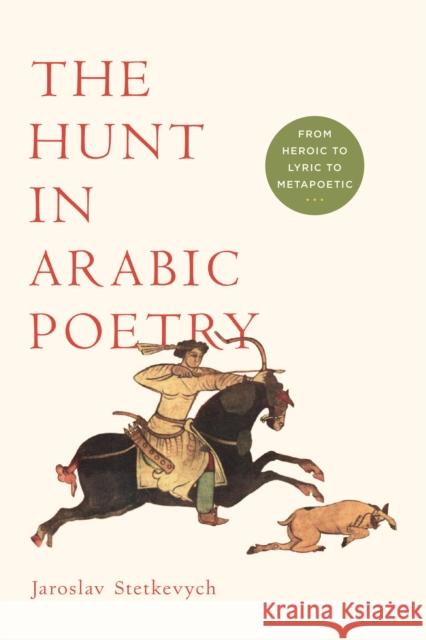The Hunt in Arabic Poetry: From Heroic to Lyric to Metapoetic » książka
The Hunt in Arabic Poetry: From Heroic to Lyric to Metapoetic
ISBN-13: 9780268041519 / Angielski / Miękka / 2015 / 368 str.
Among the world s major literary traditions, Arabic poetry is perhaps unique in that the theme of the hunt runs in a continuous, if uneven, current from the pre-Islamic, oral tradition, dating as far back as the fifth century CE, through the coming of Islam in the seventh century and the Umayyad and 'Abbasid caliphates, ultimately serving as a classical substrate for the radical Modernism of the twentieth century. This striking continuity of theme and motif of the pursuer the hunter, companions, his steed, hounds, or falcon and the pursued, whether the prey be oryx, onager, gazelle, hare, quail, or fox, is subject to dramatic transformations of poetic genre, structure, and sensibility throughout the arc of Arab cultural history. Through elegant translations and compelling interpretations, Jaroslav Stetkevych brings this dynamic Arabic tradition fully into the purview of contemporary cultural and humanistic studies.
In the chapters of Part I of "The Hunt in Arabic Poetry," Stetkevych explores the divergent themes of the heroic and the anti-heroic hunter within the grand genre of archaic Arabic odes and its transformation with the transition to Islam to a poetics of sacrifice and redemption. Part II traces the emergent aesthetics of the free-standing hunt lyric within the courtly culture of the Umayyad and Abbasid caliphates and the transition from description to imagism, concluding with the appearance of the long narrative hunt poem. Part III moves to the high Modernism of twentieth-century Arab free-verse poets and with it the reemergence of the classical theme of the hunt, now as a metaphor for the Modernist poet s metapoetic pursuit of the poem itself.
"Jaroslav Stetkevych's "The Hunt in Arabic Poetry" is an astounding achievement. Not only does he map the genealogy of the hunt as a poetic preoccupation with a number of thematic and semiotic markers and mechanisms; he also draws a history of cultural complexity through significant temporal signposts that happen to reflect on Arab political and social life. In the end, reading his book is no less than studying Arab cultural history through one significant poetic endeavor that distinguishes it among other cultures." Muhsin al-Musawi, Columbia University"











